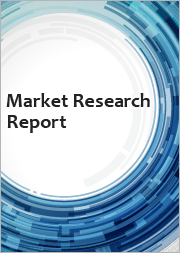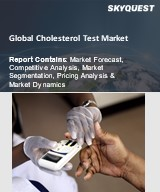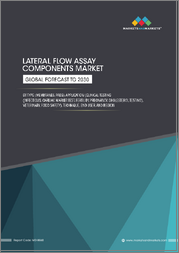
|
시장보고서
상품코드
1447087
콜레스테롤 검사 시장 예측(-2030년) : 제품 유형별, 검사 유형별, 유통 채널별, 최종사용자별, 지역별 세계 분석Cholesterol Test Market Forecasts to 2030 - Global Analysis By Product Type, Test Type, Distribution Channel, End User and By Geography |
||||||
Stratistics MRC에 따르면, 세계 콜레스테롤 검사 시장은 2023년 68억 4,000만 달러로 예측 기간 동안 10.3%의 CAGR로 성장하여 2030년에는 135억 달러에 달할 것으로 예상됩니다.
콜레스테롤 검사는 혈액 내 콜레스테롤 수치를 측정하는 것을 목적으로 하는 진단 절차입니다. 저밀도 지단백(LDL), 고밀도 지단백(HDL), 중성지방을 포함한 다양한 종류의 콜레스테롤을 평가하고 심혈관 건강 상태를 평가하는 데 필수적입니다. 일반적으로 콜레스테롤 검사는 혈액을 채취하여 실시하며, 심장병이 발생하거나 심혈관 질환이 발생할 위험이 있는 사람을 식별하는 데 도움이 됩니다.
세계보건기구(WHO)에 따르면, 2022년에는 6억 5,000만 명 이상의 성인이 비만입니다.
심혈관 질환의 유병률 증가
심장마비와 뇌졸중을 포함한 심혈관 질환은 전 세계적으로 이환율과 사망률의 주요 원인이 되고 있습니다. 높은 콜레스테롤 수치는 이러한 질환의 주요 위험 요소입니다. 심혈관 질환의 유병률이 지속적으로 증가함에 따라 콜레스테롤 검사의 필요성이 증가하고 있습니다. 콜레스테롤 검사는 저밀도 지단백(LDL) 콜레스테롤, 고밀도 지단백(HDL) 콜레스테롤, 중성지방 등 다양한 콜레스테롤 성분의 수치를 평가하는 데 도움이 됩니다. 전반적으로 심혈관 질환의 유병률 증가는 시장 수요를 촉진하는 요인으로 작용하고 있습니다.
높은 비용
검사실 검사, 진단 장비, 전문가 비용 등 콜레스테롤 검사와 관련된 높은 비용은 특히 보험에 가입하지 않았거나 의료 서비스를 이용할 수 없는 사람들에게 경제적 장벽이 될 수 있습니다. 또한, 의료 서비스 제공자는 저렴한 검사 옵션을 제공해야 하는 필요성과 수익성을 유지하고 운영 비용을 충당하는 것 사이에서 균형을 맞춰야 하는 과제에 직면해 있습니다. 그 결과, 높은 비용은 콜레스테롤 검사 시장에 큰 위협이 되고 있습니다.
기술의 발전
새로운 바이오마커와 멀티플렉스 검사 플랫폼의 통합으로 종합적인 지질 프로파일링이 가능해져 기존의 콜레스테롤 측정에 그치지 않고 심혈관 위험 요인을 보다 종합적으로 평가할 수 있게 되었습니다. 또한, 실험실 기반 콜레스테롤 검사 기술의 발전으로 자동 분석기 및 고처리량 시스템을 도입하여 검사 효율성과 확장성을 향상시키고 인적 오류 및 운영 비용을 절감할 수 있게 되었습니다.
제한적인 인식
많은 사람들이 콜레스테롤 검사가 심장병과 뇌졸중 위험을 평가하는 데 있어 중요하다는 사실을 모르고 있으며, 특히 무증상자의 검사 비율이 낮습니다. 또한, 콜레스테롤 검사 절차에 대한 오해와 잘못된 정보, 침습성에 대한 인식, 채혈에 따른 불편함 등이 검사를 받지 않으려는 사람들을 더 멀리하게 만들 수 있습니다. 따라서 낮은 인지도는 시장 확대를 제한하는 큰 요인으로 작용하고 있습니다.
COVID-19의 영향
COVID-19는 콜레스테롤 검사 시장에 부정적인 영향을 미쳤습니다. 초기에는 의료 시스템의 초점이 위기 관리에 집중되어 콜레스테롤 검사 및 예방 의료를 포함한 일상적인 의료 서비스의 중단으로 이어졌습니다. 급하지 않은 많은 의료 예약이 연기되거나 취소되어 콜레스테롤 검사가 감소했습니다. 또한 바이러스 감염에 대한 우려로 인해 꼭 필요한 경우를 제외하고는 의료 시설을 피하게 되면서 콜레스테롤 검사를 받는 사람의 수가 더욱 감소했습니다.
예측 기간 동안 테스트 키트 부문이 가장 큰 시장으로 성장할 것으로 예상
검사 키트 부문이 가장 큰 점유율을 차지할 것으로 추정됩니다. 이러한 키트에는 일반적으로 기존 실험실 이외의 장소에서 콜레스테롤 검사를 수행하는 데 필요한 모든 구성요소가 포함되어 있습니다. 종종 검사 스트립, 채혈용 랜싯, 분석에 필요한 용액 및 시약이 포함되어 있습니다. 의료 서비스 제공자는 또한 콜레스테롤 검사 키트를 사용하여 환자 진료 및 건강 검진 시 신속한 평가를 수행합니다. 또한, 이러한 키트는 빠른 결과를 제공하여 적시에 개입 및 치료 결정을 내릴 수 있도록 돕습니다.
예측 기간 동안 총 콜레스테롤 검사 분야가 가장 높은 CAGR을 보일 것으로 예상
총 콜레스테롤 검사 분야는 예측 기간 동안 유리한 성장세를 보일 것으로 예상됩니다. 이 검사는 고밀도 지단백(HDL) 콜레스테롤과 저밀도 지단백(LDL) 콜레스테롤, 그리고 중성지방을 포함한 혈중 콜레스테롤의 총량을 측정합니다. 총 콜레스테롤 검사는 예방적 건강 관리에서 중요한 역할을 하며, 개인의 지질 프로필과 전반적인 심혈관 건강 상태에 대한 귀중한 인사이트를 제공합니다.
가장 큰 점유율을 차지하는 지역
북미 지역은 탄탄한 의료 인프라, 첨단 진단 기술, 심혈관 질환 위험인자의 높은 유병률로 인해 예측 기간 동안 가장 큰 시장 점유율을 차지했습니다. 이 지역에는 혁신적인 콜레스테롤 저하제 및 진단 기술을 개발하는 제약 및 생명공학 기업들이 다수 존재하여 시장 성장과 기술 혁신을 촉진하고 있습니다. 또한, 공중보건 캠페인과 교육 활동으로 인해 콜레스테롤 관리와 건강한 생활습관 선택의 중요성에 대한 인식이 높아지면서 콜레스테롤 검사 서비스 및 제품에 대한 수요가 더욱 증가하고 있습니다.
CAGR이 가장 높은 지역:
아시아태평양은 예측 기간 동안 수익성 높은 성장을 이룰 것으로 예상됩니다. 아시아태평양 국가들은 고령화와 가처분 소득이 높은 중산층의 증가와 같은 인구 통계학적 변화를 경험하고 있으며, 이는 콜레스테롤 검사를 포함한 헬스케어 서비스에 대한 수요를 촉진하고 있습니다. 또한, 심혈관계 건강 증진 및 질병 예방 프로그램 등 비감염성 질환에 대처하기 위한 정부의 노력은 이 지역의 시장 성장을 더욱 촉진하고 있습니다.
무료 커스터마이징 제공:
이 보고서를 구독하는 고객은 다음과 같은 무료 맞춤화 옵션 중 하나를 사용할 수 있습니다:
- 기업 개요
- 추가 시장 기업의 종합적인 프로파일링(최대 3개사까지)
- 주요 기업 SWOT 분석(최대 3개사)
- 지역 세분화
- 고객의 관심에 따른 주요 국가별 시장 추정치, 예측, CAGR(주: 타당성 검토에 따른)
- 경쟁사 벤치마킹
- 제품 포트폴리오, 지리적 입지, 전략적 제휴를 기반으로 한 주요 기업 벤치마킹
목차
제1장 주요 요약
제2장 서문
- 개요
- 이해관계자
- 조사 범위
- 조사 방법
- 데이터 마이닝
- 데이터 분석
- 데이터 검증
- 조사 접근법
- 조사 소스
- 1차 조사 소스
- 2차 조사 소스
- 가정
제3장 시장 동향 분석
- 성장 촉진요인
- 성장 억제요인
- 기회
- 위협
- 제품 분석
- 최종사용자 분석
- 신흥 시장
- 신종 코로나바이러스 감염증(COVID-19)의 영향
제4장 Porter's Five Forces 분석
- 공급 기업의 교섭력
- 구매자의 교섭력
- 대체품의 위협
- 신규 참여업체의 위협
- 경쟁 기업 간의 경쟁 관계
제5장 세계의 콜레스테롤 검사 시장 : 제품 유형별
- 검사 스트립
- 검사 키트
- 검사 미터
- 기타 제품 유형
제6장 세계의 콜레스테롤 검사 시장 : 검사 유형별
- 고밀도 리포단백질(HDL) 콜레스테롤
- 저밀도 리포단백질(LDL) 콜레스테롤
- 총 콜레스테롤 검사
- 중성 지방/VLDL 콜레스테롤 검사
- 기타 검사 유형
제7장 세계의 콜레스테롤 검사 시장 : 유통 채널별
- 일반의약품(OTC)
- 처방전 기반
제8장 세계의 콜레스테롤 검사 시장 : 최종사용자별
- 재택 케어
- 병원과 클리닉
- 진단 센터
- 기타 최종사용자
제9장 세계의 콜레스테롤 검사 시장 : 지역별
- 북미
- 미국
- 캐나다
- 멕시코
- 유럽
- 독일
- 영국
- 이탈리아
- 프랑스
- 스페인
- 기타 유럽
- 아시아태평양
- 일본
- 중국
- 인도
- 호주
- 뉴질랜드
- 한국
- 기타 아시아태평양
- 남미
- 아르헨티나
- 브라질
- 칠레
- 기타 남미
- 중동 및 아프리카
- 사우디아라비아
- 아랍에미리트
- 카타르
- 남아프리카공화국
- 기타 중동 및 아프리카
제10장 주요 발전
- 계약, 파트너십, 협업, 합작투자
- 인수와 합병
- 신제품 발매
- 사업 확대
- 기타 주요 전략
제11장 기업 개요
- Thermo Fisher Scientific
- Cell Biolabs, Inc.
- Randox Laboratories Ltd.
- Clinical Reference Laboratory, Inc.
- Quest Diagnostics Incorporated
- Laboratory Corporation of America Holdings
- Alere Inc.
- PTS Diagnostics
- Eurofins Scientific
- F. Hoffmann-La Roche AG
- Horiba Ltd
- Danaher Corp
- Abbott Laboratories
- Nova Biomedical
According to Stratistics MRC, the Global Cholesterol Test Market is accounted for $6.84 billion in 2023 and is expected to reach $13.5 billion by 2030 growing at a CAGR of 10.3% during the forecast period. A cholesterol test is a diagnostic procedure aimed at measuring the levels of cholesterol in the blood. It assesses various types of cholesterol, including low-density lipoprotein (LDL), high-density lipoprotein (HDL), and triglycerides, which are essential for evaluating cardiovascular health. Typically conducted through a blood sample, cholesterol testing helps identify individuals at risk of developing heart disease or experiencing cardiovascular events.
According to the World Health Organization (WHO), in 2022, over 650 million adults were obese.
Market Dynamics:
Driver:
Rising prevalence of cardiovascular diseases
Cardiovascular diseases, including heart attacks and strokes, are leading causes of morbidity and mortality globally. High cholesterol levels are a major risk factor for these diseases. As the prevalence of cardiovascular diseases continues to rise, there is a growing need for cholesterol testing. Cholesterol testing helps in assessing the levels of different cholesterol components, such as low-density lipoprotein (LDL) cholesterol, high-density lipoprotein (HDL) cholesterol, and triglycerides. Overall, the rising prevalence of cardiovascular diseases is a factor driving market demand.
Restraint:
High cost
The high costs associated with cholesterol testing procedures, including laboratory tests, diagnostic equipment, and professional fees, can create financial barriers for individuals, particularly those without adequate insurance coverage or access to healthcare services. Moreover, healthcare providers face challenges in balancing the need to provide affordable testing options with maintaining profitability and covering operational expenses. As a result, high costs present a significant threat to the cholesterol test market.
Opportunity:
Technological advancements
The integration of novel biomarkers and multiplex testing platforms enables comprehensive lipid profiling, providing a more holistic assessment of cardiovascular risk factors beyond traditional cholesterol measurements. Furthermore, advancements in laboratory-based cholesterol testing technologies have led to the introduction of automated analyzers and high-throughput systems, enhancing testing efficiency and scalability while reducing human error and operational costs.
Threat:
Limited awareness
Many individuals remain unaware of the importance of cholesterol testing in assessing their risk of heart disease and stroke, leading to low testing rates, especially among asymptomatic individuals. Additionally, misconceptions or misinformation about cholesterol testing procedures, perceived invasiveness, or discomfort associated with blood draws may further deter individuals from seeking testing. Therefore, limited awareness is a significant factor limiting market expansion.
Covid-19 Impact
The COVID-19 pandemic had a negative impact on the cholesterol test market. Initially, the focus of healthcare systems shifted towards managing the crisis, leading to disruptions in routine medical services, including cholesterol testing and preventive care. Many non-urgent medical appointments were postponed or cancelled, resulting in a decline in cholesterol screenings. Additionally, concerns about virus transmission prompted individuals to avoid healthcare facilities unless absolutely necessary, further reducing the number of people seeking cholesterol tests.
The test kits segment is expected to be the largest during the forecast period
The test kits segment is estimated to hold the largest share. These kits typically contain all the necessary components for conducting cholesterol tests outside of traditional laboratory settings. They often include test strips, lancets for blood sampling, and solutions or reagents required for analysis. Healthcare providers also rely on cholesterol test kits for rapid assessments during patient consultations or health screenings. Additionally, these kits offer quick results, allowing for timely interventions and treatment decisions.
The total cholesterol test segment is expected to have the highest CAGR during the forecast period
The total cholesterol test segment is anticipated to have lucrative growth during the forecast period. This test measures the total amount of cholesterol present in the blood, including both high-density lipoprotein (HDL) cholesterol and low-density lipoprotein (LDL) cholesterol, along with triglycerides. The total cholesterol test plays a critical role in preventive healthcare, providing valuable insights into an individual's lipid profile and overall cardiovascular health status.
Region with largest share:
North America commanded the largest market share during the extrapolated period owing to the robust healthcare infrastructure, advanced diagnostic technologies, and a high prevalence of cardiovascular disease risk factors. The region is home to numerous pharmaceutical and biotechnology companies engaged in developing innovative cholesterol-lowering medications and diagnostic technologies, driving market growth and innovation. Additionally, public health campaigns and educational efforts raise awareness about the importance of cholesterol management and healthy lifestyle choices, further driving demand for cholesterol testing services and products.
Region with highest CAGR:
Asia Pacific is expected to witness profitable growth over the projection period. Countries in the Asia Pacific region are experiencing demographic shifts, including aging populations and the emergence of a middle-class segment with greater disposable income, driving demand for healthcare services, including cholesterol testing. Additionally, government initiatives aimed at addressing non-communicable diseases, including cardiovascular health promotion and disease prevention programs, further propel market growth in this region.
Key players in the market
Some of the key players in the Cholesterol Test Market include Thermo Fisher Scientific, Cell Biolabs, Inc., Randox Laboratories Ltd., Clinical Reference Laboratory, Inc., Quest Diagnostics Incorporated, Laboratory Corporation of America Holdings, Alere Inc., PTS Diagnostics, Eurofins Scientific, F. Hoffmann-La Roche AG, Horiba Ltd, Danaher Corp, Abbott Laboratories and Nova Biomedical.
Key Developments:
In December 2023, Randox Laboratories Ltd and Transgene entered into a scientific collaboration, with the aim of joining their competences to deliver a novel therapeutic approach to oncology therapies.
In May 2023, Thermo Fisher, the world leader in serving science, has signed a Memorandum of Understanding ("MOU") with the National Research and Innovation Agency of Indonesia (BRIN, Badan Riset dan Inovasi Nasional) to enable and enhance the country's national research and innovation infrastructure and capability.
In February 2023, Roche announced that it has expanded its collaboration with Janssen Biotech Inc. (Janssen) to create companion diagnostics for targeted therapies, further strengthening research and innovation activities.
In November 2022, Danaher Corporation, a global science and technology innovator, announced that it has entered a strategic partnership with Duke University to form its first Danaher Beacon for Gene Therapy Innovation.
Product Types Covered:
- Test Strips
- Test Kits
- Test Meters
- Other Product Types
Test Types Covered:
- High-Density Lipoprotein (HDL) Cholesterol
- Low-Density Lipoprotein (LDL) Cholesterol
- Total Cholesterol Test
- Triglycerides/VLDL Cholesterol Test
- Other Test Types
Distribution Channels Covered:
- Over the Counter
- Prescription Based
End Users Covered:
- Homecare
- Hospitals & Clinics
- Diagnostic Centers
- Other End Users
Regions Covered:
- North America
- US
- Canada
- Mexico
- Europe
- Germany
- UK
- Italy
- France
- Spain
- Rest of Europe
- Asia Pacific
- Japan
- China
- India
- Australia
- New Zealand
- South Korea
- Rest of Asia Pacific
- South America
- Argentina
- Brazil
- Chile
- Rest of South America
- Middle East & Africa
- Saudi Arabia
- UAE
- Qatar
- South Africa
- Rest of Middle East & Africa
What our report offers:
- Market share assessments for the regional and country-level segments
- Strategic recommendations for the new entrants
- Covers Market data for the years 2021, 2022, 2023, 2026, and 2030
- Market Trends (Drivers, Constraints, Opportunities, Threats, Challenges, Investment Opportunities, and recommendations)
- Strategic recommendations in key business segments based on the market estimations
- Competitive landscaping mapping the key common trends
- Company profiling with detailed strategies, financials, and recent developments
- Supply chain trends mapping the latest technological advancements
Free Customization Offerings:
All the customers of this report will be entitled to receive one of the following free customization options:
- Company Profiling
- Comprehensive profiling of additional market players (up to 3)
- SWOT Analysis of key players (up to 3)
- Regional Segmentation
- Market estimations, Forecasts and CAGR of any prominent country as per the client's interest (Note: Depends on feasibility check)
- Competitive Benchmarking
- Benchmarking of key players based on product portfolio, geographical presence, and strategic alliances
Table of Contents
1 Executive Summary
2 Preface
- 2.1 Abstract
- 2.2 Stake Holders
- 2.3 Research Scope
- 2.4 Research Methodology
- 2.4.1 Data Mining
- 2.4.2 Data Analysis
- 2.4.3 Data Validation
- 2.4.4 Research Approach
- 2.5 Research Sources
- 2.5.1 Primary Research Sources
- 2.5.2 Secondary Research Sources
- 2.5.3 Assumptions
3 Market Trend Analysis
- 3.1 Introduction
- 3.2 Drivers
- 3.3 Restraints
- 3.4 Opportunities
- 3.5 Threats
- 3.6 Product Analysis
- 3.7 End User Analysis
- 3.8 Emerging Markets
- 3.9 Impact of Covid-19
4 Porters Five Force Analysis
- 4.1 Bargaining power of suppliers
- 4.2 Bargaining power of buyers
- 4.3 Threat of substitutes
- 4.4 Threat of new entrants
- 4.5 Competitive rivalry
5 Global Cholesterol Test Market, By Product Type
- 5.1 Introduction
- 5.2 Test Strips
- 5.3 Test Kits
- 5.4 Test Meters
- 5.5 Other Product Types
6 Global Cholesterol Test Market, By Test Type
- 6.1 Introduction
- 6.2 High-Density Lipoprotein (HDL) Cholesterol
- 6.3 Low-Density Lipoprotein (LDL) Cholesterol
- 6.4 Total Cholesterol Test
- 6.5 Triglycerides/VLDL Cholesterol Test
- 6.6 Other Test Types
7 Global Cholesterol Test Market, By Distribution Channel
- 7.1 Introduction
- 7.2 Over the Counter
- 7.3 Prescription Based
8 Global Cholesterol Test Market, By End User
- 8.1 Introduction
- 8.2 Homecare
- 8.3 Hospitals & Clinics
- 8.4 Diagnostic Centers
- 8.5 Other End Users
9 Global Cholesterol Test Market, By Geography
- 9.1 Introduction
- 9.2 North America
- 9.2.1 US
- 9.2.2 Canada
- 9.2.3 Mexico
- 9.3 Europe
- 9.3.1 Germany
- 9.3.2 UK
- 9.3.3 Italy
- 9.3.4 France
- 9.3.5 Spain
- 9.3.6 Rest of Europe
- 9.4 Asia Pacific
- 9.4.1 Japan
- 9.4.2 China
- 9.4.3 India
- 9.4.4 Australia
- 9.4.5 New Zealand
- 9.4.6 South Korea
- 9.4.7 Rest of Asia Pacific
- 9.5 South America
- 9.5.1 Argentina
- 9.5.2 Brazil
- 9.5.3 Chile
- 9.5.4 Rest of South America
- 9.6 Middle East & Africa
- 9.6.1 Saudi Arabia
- 9.6.2 UAE
- 9.6.3 Qatar
- 9.6.4 South Africa
- 9.6.5 Rest of Middle East & Africa
10 Key Developments
- 10.1 Agreements, Partnerships, Collaborations and Joint Ventures
- 10.2 Acquisitions & Mergers
- 10.3 New Product Launch
- 10.4 Expansions
- 10.5 Other Key Strategies
11 Company Profiling
- 11.1 Thermo Fisher Scientific
- 11.2 Cell Biolabs, Inc.
- 11.3 Randox Laboratories Ltd.
- 11.4 Clinical Reference Laboratory, Inc.
- 11.5 Quest Diagnostics Incorporated
- 11.6 Laboratory Corporation of America Holdings
- 11.7 Alere Inc.
- 11.8 PTS Diagnostics
- 11.9 Eurofins Scientific
- 11.10 F. Hoffmann-La Roche AG
- 11.11 Horiba Ltd
- 11.12 Danaher Corp
- 11.13 Abbott Laboratories
- 11.14 Nova Biomedical



















